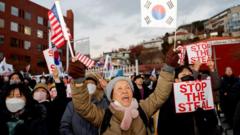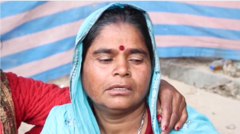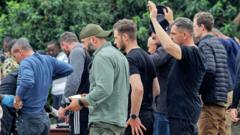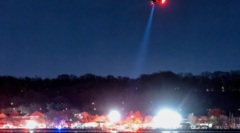Supporters of impeached President Yoon Suk Yeol defend his residence against police efforts, marking new conflicts in South Korean politics.
Impeached President Yoon's Arrest Attempts Descend into Chaos: A First for South Korea

Impeached President Yoon's Arrest Attempts Descend into Chaos: A First for South Korea
Tensions escalate as police fail to arrest South Korea's suspended president amid a standoff with loyal supporters.
The tension began in the early hours, as supporters of suspended President Yoon Suk Yeol gathered outside his residence, having camped overnight to thwart any attempts for his arrest. By dawn, it became clear that the police faced a daunting task; a barricade of soldiers and loyalists formed a determined wall, obstructing investigators who sought to execute a legally obtained warrant. Crying and wailing protesters expressed their fears, caught in a limbo as the law enforcement officials found themselves trapped between duty and a mass mobilization of supporters.
Confusion reigned supreme as officers made attempts to breach the presidential compound. Despite having marched up to the doors, they were quickly met with hostile resistance from Yoon's security team. This unprecedented situation unfolded as investigators awaited the resolution of their stalled mission, which led to intense emotions outside the residence, increasing discontent among the crowds.
In South Korea's turbulent political landscape, this situation is a first— a sitting president facing arrest raises serious questions about power dynamics. Impeached just weeks earlier, Yoon Suk Yeol is accused of grave allegations, including inciting insurrection, a charge that could warrant severe penalties. His reluctance to cooperate with authorities has culminated in the current bizarre confrontation, harkening back to a system Yoon cultivated himself, surrounding himself with loyalists to secure power.
His core supporters have remained steadfast despite growing public outcry against his rule. Many have taken to camping out in subzero conditions, declaring their readiness to sacrifice themselves to protect Yoon, while rallying around conspiracy theories regarding the legitimacy of last year’s election. They carried signs and chanted slogans echoing those sentiments while bolstering their sense of victory after law enforcement's retreat.
The acting president, Choi Sang-mok, now faces scrutiny regarding the extent of his authority. Questions linger whether he might intervene to dismiss Yoon's security personnel and expedite the arrest proceedings. As the opposition party demands decisive action from law enforcement, the window for a renewed attempt at arrest dwindles, with a deadline set for January 6th. With the morale high among Yoon's loyalists—and their numbers swelling—the stakes for law enforcement seem precariously high, underscoring a precarious moment in South Korea's political narrative.
Confusion reigned supreme as officers made attempts to breach the presidential compound. Despite having marched up to the doors, they were quickly met with hostile resistance from Yoon's security team. This unprecedented situation unfolded as investigators awaited the resolution of their stalled mission, which led to intense emotions outside the residence, increasing discontent among the crowds.
In South Korea's turbulent political landscape, this situation is a first— a sitting president facing arrest raises serious questions about power dynamics. Impeached just weeks earlier, Yoon Suk Yeol is accused of grave allegations, including inciting insurrection, a charge that could warrant severe penalties. His reluctance to cooperate with authorities has culminated in the current bizarre confrontation, harkening back to a system Yoon cultivated himself, surrounding himself with loyalists to secure power.
His core supporters have remained steadfast despite growing public outcry against his rule. Many have taken to camping out in subzero conditions, declaring their readiness to sacrifice themselves to protect Yoon, while rallying around conspiracy theories regarding the legitimacy of last year’s election. They carried signs and chanted slogans echoing those sentiments while bolstering their sense of victory after law enforcement's retreat.
The acting president, Choi Sang-mok, now faces scrutiny regarding the extent of his authority. Questions linger whether he might intervene to dismiss Yoon's security personnel and expedite the arrest proceedings. As the opposition party demands decisive action from law enforcement, the window for a renewed attempt at arrest dwindles, with a deadline set for January 6th. With the morale high among Yoon's loyalists—and their numbers swelling—the stakes for law enforcement seem precariously high, underscoring a precarious moment in South Korea's political narrative.




















